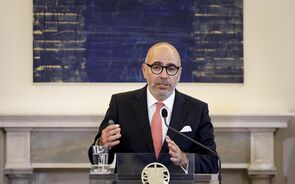Taxas de Juro na Europa
1 Mensagem
|Página 1 de 1
Taxas de Juro na Europa
European Economies: Growth Quickens in Germany, Italy, France
May 13 (Bloomberg) -- Germany, France and Italy, the three largest economies in the 12-nation euro region, reported accelerating growth in the first quarter, easing pressure on the European Central Bank to lower interest rates.
Germany's economy expanded 0.4 percent from the fourth quarter, the fastest pace in three years, and Italy also grew 0.4 percent after zero growth in the fourth quarter, the national statistics offices said. France yesterday reported expansion of 0.8 percent. All three growth rates exceeded the median forecasts in Bloomberg News surveys of economists.
``All the figures were surprisingly good,'' said Markus Heider, an economist at Deutsche Bank AG in Frankfurt. ``This confirms the ECB's view of a gradual recovery. There's little chance for a rate cut in the next few months.''
The ECB, which has rejected calls from political leaders including German Chancellor Gerhard Schroeder to lower borrowing costs, today said recent economic reports confirm its view that a recovery is on track this year. Western European car sales rose in April and companies including Linde AG and truckmaker MAN AG reported higher sales and profit for the first quarter.
In the Netherlands, the fifth-largest euro region economy, gross domestic product grew 0.4 percent in the first quarter, the statistics office said today. Companies including Amsterdam-based Royal Philips Electronics NV have boosted shipments abroad.
Eurostat Report
The reports from Germany, France and Italy suggest growth for the whole euro region may have exceeded the 0.4 percent median forecast of 39 economists in a Bloomberg News survey. Eurostat, the European Union's statistics office, releases its preliminary estimate tomorrow at 11 a.m. in Luxembourg.
``After what we saw from the three biggest countries, euro- zone growth may have been 0.6 percent in the first quarter,'' said Carsten Klude, head of strategy at Hamburg-based M.M. Warburg, which manages the equivalent of about $19 billion. ``We're working towards an economic revival.''
The pace of growth in the euro region is still muted compared with the U.S. and Japan. The U.S., the world's largest economy, expanded 1 percent in the first quarter, on a comparable basis, and grew at an annualized rate of 4.2 percent. Germany, France and Italy don't provide annualized growth rates for GDP.
Demand from abroad pulled the euro region out of a contraction in the second quarter of last year and is still driving growth in Germany, Europe's biggest economy, the Federal Statistics Office said. Exports rose almost twice as fast as imports in the period, the statistics office said. Italy didn't provide any commentary in its GDP report.
Linde, Deutsche Telekom
Exports are equivalent to about a third of Germany's economy. Linde, Europe's second-largest maker of forklifts, said today sales rose 8.2 percent in the first quarter, boosted by demand from Russia, Asia and North America. Deutsche Telekom AG, Europe's biggest phone company, said growth in the U.S. drove an increase in earnings at its wireless division in the period.
European stocks rose, with the Dow Jones Stoxx 50 Index rising 0.6 percent to 2670.40 at 12 p.m. The euro fell 0.7 percent against the dollar to $1.1825 from $1.1816. The euro's 8 percent drop against the U.S. currency from a record on Feb. 18 has brightened the outlook for exporters in the euro region.
Consumer spending has been the weakest link in Germany's and the euro region's recovery so far. Rising unemployment and concern about welfare cuts led to a decline in German consumer spending for the past three quarters. In Italy, the collapse of Parmalat Finanzaria SpA, the nation's biggest dairy, strikes at automaker Fiat SpA and concern about terrorism have kept household confidence near a 10-year low.
Consumers Hold Back
German retail sales fell in March and the HDE retailers association yesterday said higher prices from taxes, medical costs and oil prices damped spending in the first four months of the year. The group ``hopes'' for a recovery in the second half of the year, said HDE President Hermann Franzen in Berlin.
``The economic situation in Germany continues to concern us,'' said Deutsche Telekom Chief Financial Officer Karl-Gerhard Eick on a conference call with analysts today. ``I wouldn't expect a GDP growth rate of more than 1 percent for the full year.''
An jobless rate of more than 10 percent for the past 19 months has eroded tax receipts. Germany cut its forecast for tax revenue today, threatening a fourth breach in EU deficit rules and further delaying the government's target of balancing the budget.
In France, consumer demand propelled growth to the fastest in two years in the second quarter, national statistics office Insee said yesterday. The Bank of France today revised up its forecast for second-quarter growth to 0.6 percent from 0.5 percent.
`More Encouraging'
The Organization for Economic Cooperation and Development predicts growth of 2 percent for France this year, almost double the 1.1 percent it forecasts for Germany and 0.9 percent for Italy. The OECD expects the U.S. economy to grow 4.7 percent.
The most recent economic reports from the euro region ``have been more encouraging,'' the ECB said in its monthly report. The Frankfurt-based central bank has left its benchmark rate unchanged at 2 percent, the lowest in any of the euro countries for six decades, since June. Policy makers next set rates on June 3.
Expectations that the U.S. Federal Reserve will raise interest rates at its next meeting on June 30 and increased business confidence in the euro region have all but wiped out speculation about a rate cut by the ECB this year.
The yield on the interest-rate futures contract for September has risen to 2.24 percent from 1.85 percent on March 26. That compares with a three-month money market rate of 2.09 percent.
May 13 (Bloomberg) -- Germany, France and Italy, the three largest economies in the 12-nation euro region, reported accelerating growth in the first quarter, easing pressure on the European Central Bank to lower interest rates.
Germany's economy expanded 0.4 percent from the fourth quarter, the fastest pace in three years, and Italy also grew 0.4 percent after zero growth in the fourth quarter, the national statistics offices said. France yesterday reported expansion of 0.8 percent. All three growth rates exceeded the median forecasts in Bloomberg News surveys of economists.
``All the figures were surprisingly good,'' said Markus Heider, an economist at Deutsche Bank AG in Frankfurt. ``This confirms the ECB's view of a gradual recovery. There's little chance for a rate cut in the next few months.''
The ECB, which has rejected calls from political leaders including German Chancellor Gerhard Schroeder to lower borrowing costs, today said recent economic reports confirm its view that a recovery is on track this year. Western European car sales rose in April and companies including Linde AG and truckmaker MAN AG reported higher sales and profit for the first quarter.
In the Netherlands, the fifth-largest euro region economy, gross domestic product grew 0.4 percent in the first quarter, the statistics office said today. Companies including Amsterdam-based Royal Philips Electronics NV have boosted shipments abroad.
Eurostat Report
The reports from Germany, France and Italy suggest growth for the whole euro region may have exceeded the 0.4 percent median forecast of 39 economists in a Bloomberg News survey. Eurostat, the European Union's statistics office, releases its preliminary estimate tomorrow at 11 a.m. in Luxembourg.
``After what we saw from the three biggest countries, euro- zone growth may have been 0.6 percent in the first quarter,'' said Carsten Klude, head of strategy at Hamburg-based M.M. Warburg, which manages the equivalent of about $19 billion. ``We're working towards an economic revival.''
The pace of growth in the euro region is still muted compared with the U.S. and Japan. The U.S., the world's largest economy, expanded 1 percent in the first quarter, on a comparable basis, and grew at an annualized rate of 4.2 percent. Germany, France and Italy don't provide annualized growth rates for GDP.
Demand from abroad pulled the euro region out of a contraction in the second quarter of last year and is still driving growth in Germany, Europe's biggest economy, the Federal Statistics Office said. Exports rose almost twice as fast as imports in the period, the statistics office said. Italy didn't provide any commentary in its GDP report.
Linde, Deutsche Telekom
Exports are equivalent to about a third of Germany's economy. Linde, Europe's second-largest maker of forklifts, said today sales rose 8.2 percent in the first quarter, boosted by demand from Russia, Asia and North America. Deutsche Telekom AG, Europe's biggest phone company, said growth in the U.S. drove an increase in earnings at its wireless division in the period.
European stocks rose, with the Dow Jones Stoxx 50 Index rising 0.6 percent to 2670.40 at 12 p.m. The euro fell 0.7 percent against the dollar to $1.1825 from $1.1816. The euro's 8 percent drop against the U.S. currency from a record on Feb. 18 has brightened the outlook for exporters in the euro region.
Consumer spending has been the weakest link in Germany's and the euro region's recovery so far. Rising unemployment and concern about welfare cuts led to a decline in German consumer spending for the past three quarters. In Italy, the collapse of Parmalat Finanzaria SpA, the nation's biggest dairy, strikes at automaker Fiat SpA and concern about terrorism have kept household confidence near a 10-year low.
Consumers Hold Back
German retail sales fell in March and the HDE retailers association yesterday said higher prices from taxes, medical costs and oil prices damped spending in the first four months of the year. The group ``hopes'' for a recovery in the second half of the year, said HDE President Hermann Franzen in Berlin.
``The economic situation in Germany continues to concern us,'' said Deutsche Telekom Chief Financial Officer Karl-Gerhard Eick on a conference call with analysts today. ``I wouldn't expect a GDP growth rate of more than 1 percent for the full year.''
An jobless rate of more than 10 percent for the past 19 months has eroded tax receipts. Germany cut its forecast for tax revenue today, threatening a fourth breach in EU deficit rules and further delaying the government's target of balancing the budget.
In France, consumer demand propelled growth to the fastest in two years in the second quarter, national statistics office Insee said yesterday. The Bank of France today revised up its forecast for second-quarter growth to 0.6 percent from 0.5 percent.
`More Encouraging'
The Organization for Economic Cooperation and Development predicts growth of 2 percent for France this year, almost double the 1.1 percent it forecasts for Germany and 0.9 percent for Italy. The OECD expects the U.S. economy to grow 4.7 percent.
The most recent economic reports from the euro region ``have been more encouraging,'' the ECB said in its monthly report. The Frankfurt-based central bank has left its benchmark rate unchanged at 2 percent, the lowest in any of the euro countries for six decades, since June. Policy makers next set rates on June 3.
Expectations that the U.S. Federal Reserve will raise interest rates at its next meeting on June 30 and increased business confidence in the euro region have all but wiped out speculation about a rate cut by the ECB this year.
The yield on the interest-rate futures contract for September has risen to 2.24 percent from 1.85 percent on March 26. That compares with a three-month money market rate of 2.09 percent.
-
MSM
1 Mensagem
|Página 1 de 1
Quem está ligado:
Utilizadores a ver este Fórum: aaugustob69, Bing [Bot], cali010201, CC-5, cftomas, darkreflection, Google [Bot], iniciado1, karaya75, m-m, malakas, Manchini888, MarketGodzilla, maturidade, MR32, nunorpsilva, O Magriço, Olhar Leonino, PAULOJOAO, PMP69, Shimazaki_2, STRESSZERO, TTM62 e 95 visitantes


